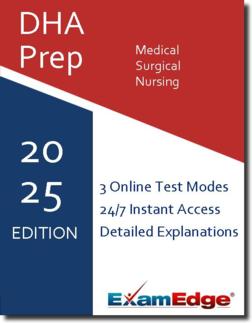DHA Medical Surgical Nursing (DHA-MedSurg) Practice Exams & Exam Prep - Topics
Based on 17 Reviews
- Real Exam Simulation: Timed questions and matching content build comfort for your DHA Medical Surgical Nursing test day.
- Instant, 24/7 Access: Web-based DHA Medical Surgical Nursing practice exams with no software needed.
- Clear Explanations: Step-by-step answers and explanations for your DHA exam to strengthen understanding.
- Boosted Confidence: Reduces anxiety and improves test-taking skills to ace your DHA Medical Surgical Nursing (DHA-MedSurg).

Understanding the exact breakdown of the DHA Medical Surgical Nursing test will help you know what to expect and how to most effectively prepare. The DHA Medical Surgical Nursing has 70 multiple-choice questions The exam will be broken down into the sections below:
| DHA Medical Surgical Nursing Exam Blueprint | ||
|---|---|---|
| Domain Name | % | Number of Questions |
| Assessment and Diagnosis | 14.67% | 10 |
| Planning, Implementation and Outcomes Evaluation | 33.33% | 23 |
| Professional Role | 30% | 21 |
| Health Teaching and Health Promotion | 22% | 15 |


